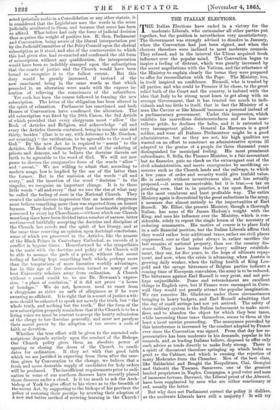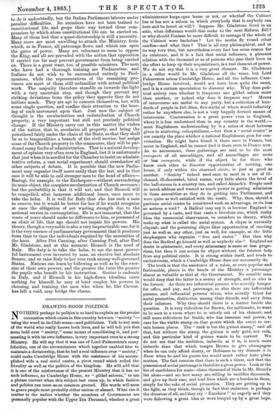THE ITALIAN ELECTIONS.
THE Italian Elections have ended in a victory for the moderate Liberals, who outnumber all other parties put together, but the position is nevertheless very unsatisfactory. The Government was strongly advised to dissolve in January, when the Convention had just been signed, and when the electors therefore were inclined to most moderate counsels. They refused, and in the interval the Ultras acquired fresh influence over the popular mind. The Convention began to inspire a feeling of distrust, which was greatly increased by the secret negotiations with the Vatican, and the reluctance of the Ministry to explain clearly the terms they were prepared to offer for reconciliation with the Pope. The Ministry, too, in itself inspired no confidence. Ricasoli, who is trusted by all parties, and who could be Premier if he chose, to the great relief both of the Court and the country, is imbued with the idea that Italy to be strong must learn to get along with an average Government, that it has trusted too much to indi- viduals and too little to itself, that in fact the Ministry of a man like Cavour or like himself becomes a personal instead of a parliamentary government. Under this impression, which exhibits his marvellous disinterestedness and no less mar- vellous pride, he declines the helm, and it is entrusted to very incompetent pilots. General La Marmora is a good soldier, and were all Italians Piedmontese might be a good administrator, but as they are not, his high qualities are wasted on an effort to construct an administrative system ill adapted to the genius of a people for three thousand years distinguished for municipal feeling. His most prominent subordinate, S. Sella, the Finance Minister, is a fair accountant but no financier, puts no check on the extravagant cost of the civil administration, and meets emergencies by sacrificing re- sources such as the Church lands and the railways, to which a few years of order and security would give tenfold value. He is entirely without inventiveness also, and has actually proposed,—it seems inconceivable, but it is true,—a tax on grinding corn, that is, in practice, a tax upon flour, levied in the most cumbrous and least profitable way. The entire Ministry again is discredited bythe great reductions in the army, a measure due almost entirely to the importunities of Earl Russell. Mr. Elliot, the present Minister, though a thorough Italian, has none of Sir James Hudson's weight with the King, and uses his influence over the Ministry, which is con- siderable, solely to repeat the single lesson of the necessity of reducing armaments. His motive of course is to place Italy in a safe financial position, but the Italian Liberals affirm that they would rather bear additional taxes, rather see civil places suppressed, sore as that point always is, rather sacrifice the last remains of national property, than see the country dis- armed. They have borne their heavy military establish- ment, they say, for five years, in the hope of ultimate repay- ment, and now, when the crisis is advancing, when Austria is growing daily weaker, when the failing health of King Leo- pold and the savage bitterness of Belgian parties indicate a coming time of European convulsion, the army is to be reduced. The bitterness against Earl Russell is very great, and not per- haps unjustifiable. Peace and retrenchment are excellent things in English eyes, but if France were encamped in Corn- wall they would not greatly attract the popular imagination. We can conceive Mr. Gladstone under those circumstances bringing in heavy budgets, and Earl Russell admitting that the day of small savings had not yet arrived. The safety of their military system is the Italian inducement to make sacri- fices, and to abandon the object for which they bear taxes, while increasing those taxes themselves, seems to them at the least a most unwise proceeding. The annoyance provoked by this interference is increased by the conduct adopted by France ever since the Convention was signed. From that day her re- presentative has been moderate in his demands, popular in his counsels, and, as leading Italians believe, disposed to offer only such advice as tends directly to make Italy strong. There is a spirit of discontent therefore springing up which bodes no good to the Cabinet, and which is causing the rejection of many Moderates from the Chamber. Men of the best class, like Baldachini and Bonghi the Neapolitans, Cini, Georgini and Galeotti the Tuscans, Sansevero, one of the greatest landed proprietors in Naples, Compagna, a good voter and man of immense fortune, Dorrucci, the Liberal priest of the Abruzzi, have been supplanted by men who are either reactionary or red, usually the latter.
But why does not Parliament correct the policy it dislikes, as the moderate Liberals have still a majority ? It will try to do it undoubtedly, but the Italian Parliament labours under peculiar difficulties. Its members have not been trained to constitutional life, and grope their way toward those com- promises by which alone constitutional life can be carried on. Many of them feel that a quasi-dictatorship is still a necessity. Many more are most unwilling to attack the Ministry, from which, as in France, all patronage flows, and which can open the gates of power. Many are reluctant to seem to oppose the King, and all are pervaded with the notion that opposition if carried too far may prevent government from being carried on. There is a great want, too, of possible ministers. The men who have had a thorough training are Piedmontese, and Italians do not wish to be surrendered entirely to Pied- montese, while the representatives of the remaining pro- vinces are most of them still unfamiliar with actual political work. The majority therefore stumble on towards the light with a very uncertain step, and though they prevent any striking deviations from the policy they approve they do not initiate much. They are apt to concern themselves, too, with some single question, and confine their attention to the bear- ing of each movement upon that. Just now the subject of thought is the secularization and redistribution of Church property, a very important but still not precisely political change. If the Ministry carry out in this matter the wishes of the nation, that is, secularize all property, and bring the priesthood fairly under the chain of the State, so that they shall be as to temporalities a branch of the civil service, but assign some of the Church property to the communes, they will be par- doned many faults of administration. That is a natural develop- ment of opinion very often seen in England, but it is unfortunate that just when it is needful for the Chamber to insist on adminis- trative reform, a vast social experiment should overshadow all other subjects of debate. It is possible that the new Parlia- ment may organize itself more easily than the last, and in that case it will be able to call stronger men to the head of affairs- Bastogi, for example, to the Exchequer—without surrendering its main object, the complete secularization of Church revenues ; but the probability is that it will not, and that Ricasoli will be compelled, after immense additional losses, once more to take the helm. It is well for Italy that she has such a man in reserve, but it would be better for her if he would recognize at once the obligation of not wasting strength due to the national service in contemplation. He is not immortal, that the waste of years should make no difference to him, or possessed of an elixir of life, that age should not impair his powers. His theory, though a verynoble is also a very impracticable one, for it is the very essence of parliamentary government that it produces from time to time the individuals required by the necessities of the hour. After Pitt Canning, after Canning Peel, after Peel Mr. Gladstone, and at this moment Ricasoli is the need of Italy. His duty is to take the helm, to use the most power- ful instrument ever invented by man, an elective but absolute Senate, and so raise Italy to her true rank among well-governed States. Nations can learn by following as well as by the exer- cise of their own powers, and the greater the tutor the greater the pupils who benefit by his instruction. Genius is endemic in Italy, and if Ricasoli in his high-flown idealism cares nothing for himself, he may at least employ his powers in choosing and training the men who when he, like Cavour, has left a void, may bridge the chasm.































 Previous page
Previous page